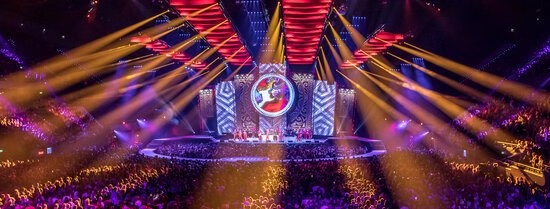How important are pop venues and music festivals in the Netherlands? Martijn Mulder (Erasmus School of History, Culture and Communication) investigated this in his doctoral thesis. He accompanied fans to concerts, interviewed directors of pop venues and dug through a database of 300,000 concerts. ‘Festivalisation’ is not at the expense of pop venues, Mulder observes. And the arrival of brand-new pop venues also has a downside, in his view.
Last May, 73-year-old Bruce Springsteen played twice in a sold-out Johan Cruijff Arena. For Taylor Swift's announced concerts in 2024, hundreds of thousands of fans are hoping to get tickets. What makes fans go all out and reach deep into their pockets to see their idol live? That is what PhD student Martijn Mulder investigated in his thesis 'I was there! Pop venues and festivals and their value in the ecosystem of live music'.
He researched the role of pop venues and music festivals. For his research, he conducted surveys among 1131 people who attended concerts. He even went along to several gigs to observe and interview concertgoers. For instance, he ended up among screaming teenage girls who are fans of pop singer Marina and spoke to a fifty-something who wanted to see one of his beloved bands play live. What stood out? "Everyone came out of the concert more energetic and happy. They indicated afterwards that physical proximity and atmosphere is very important. The title of the book "I was There" refers directly to that. My research shows that a concert experience cannot be replaced by a live stream."
Festivals do not compete with pop venues
For his thesis, he also interviewed directors and programmers at pop venues such as the Utrecht-based TivoliVredenburg and scoured a database of some 300,000 performances in search of interesting patterns. That dataset shows that the number of live performances at festivals skyrocketed between 2008 and 2016. "What is striking is that pop venues are also doing very well. It is often thought that festivalisation comes at the expense of pop venues, but this turns out not to be the case. Venues, apart from a small dip in 2016, are also showing growth," says the researcher.
According to Mulder, pop culture, which emerged in the 1960s, has become increasingly mature. Not only do you see increasingly older audiences, the venues have become increasingly professional with perfect light and sound. For instance, brand-new venues have sprung up such as the new TivoliVredenburg in Utrecht and Doornroosje in Nijmegen. This professionalisation has brought good things, according to the researcher, but there is also a downside: "Performances are sometimes directed down to the second. Even the encore and the chat in between are scripted. That while pop started as a counterculture. You didn't know what was going to happen. An artist could appear drunk on stage or sometimes not show up at all."
Pop as the new classical
The spontaneous seems to be disappearing a bit, the researcher observes. More and more often, you are not allowed to bring your drink into the venue and the proportion of seated concerts has tripled to more than 20 per cent of all performances. The rise of tribute bands is also striking. Like classical music, they re-enact songs by other (often deceased) artists. Old-fashioned rock pubs with a stage where a band plays every now and then, on the other hand, are increasingly closing their doors. "Pop seems to be becoming the new classical. While concertgoers appreciate old venues like Rotown in Rotterdam the most. Visibility is poor, the sound is not perfect and there is a stale beer smell. But for the concert experience, that doesn't seem to matter."
These new pop venues are fine buildings, but do not necessarily benefit pop culture, the PhD student believes. It leads to more sameness and the high operating costs force venues to think more and more commercially. "I spoke to a director who said, 'I have a palace, but I'm mainly concerned with getting the exploitation done'. For instance, they themselves prefer to see an up-and-coming band play, but that attracts a select group of young people who often spend little. Then they are more likely to opt for a Pink Floyd tribute band. That attracts a room full of fifty-somethings who also provide a good bar turnover."
Randstad versus province
And speaking of programming, it turned out to be quite conservative. Until 2009, 84 per cent of all artists on stage were men and the majority of artists also turned out to be from the Netherlands, England or the US. However, you do see that, especially in the Randstad, the music preference (and supply) is shifting and becoming more diverse. More female artists are performing and hip-hop, soul and experimental music are increasingly popular. In the provinces, on the contrary, you see that the offerings are becoming more conservative. "There, for example, more tribute or blues bands play. They do say that pop culture is a reflection of society. You can really see that in the live offer, it seems."
What the researcher wants to substantiate scientifically is the power of live experiences. "In our lives, fewer and fewer things are scarce. For instance, almost all music is available on Spotify. My contention is that when you have so much at your fingertips, you start to appreciate the very things that are scarce," he says. It should come as no surprise that the PhD candidate himself is also a great lover of live music. On the day of his defence, he organised the 'MulDr. Festival' at a Rotterdam pop venue. With a band on stage, of course, to ensure an unforgettable evening.
- PhD student
- More information
M. Mulder will defend his PhD dissertation on Friday 7 July 2023, entitled: ’I was There! Pop venues and festivals and their value in the ecosystem of live music‘.
- Related content

